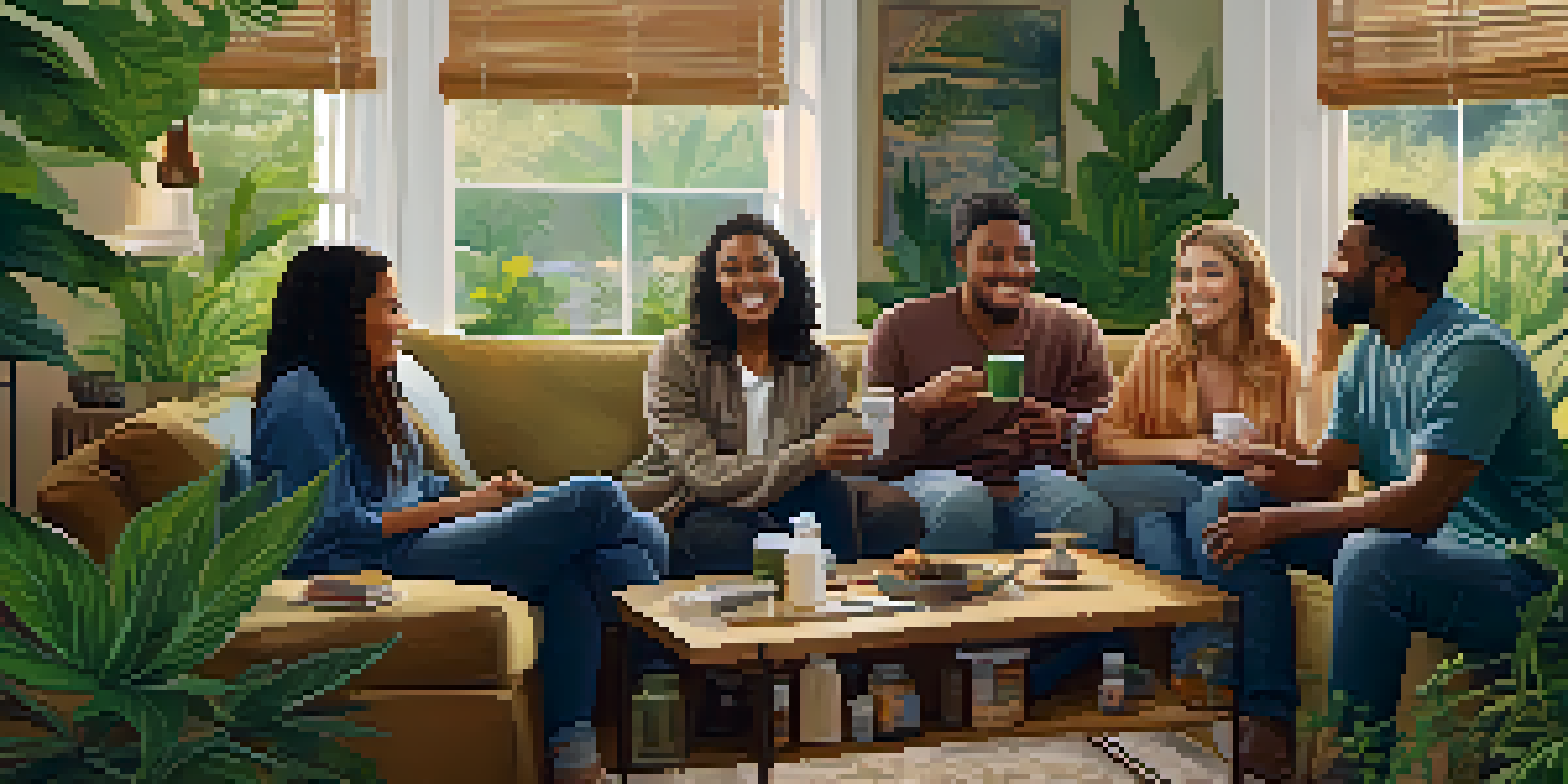The Stereotypes of Marijuana Users in Popular Media

The Origins of Marijuana User Stereotypes
Marijuana user stereotypes have deep roots in history, often stemming from societal fears and misconceptions. In the early 20th century, propaganda painted cannabis users as dangerous and deviant, contributing to a lasting stigma. These negative portrayals were amplified by sensationalized media narratives, which often lacked factual basis.
The greatest weapon against stereotypes is education.
As the media evolved, these stereotypes became common tropes in films and television, depicting users as lazy, forgetful, or even criminal. This consistent representation reinforced public perceptions and created a narrow view of what it means to use marijuana. The power of media in shaping societal norms cannot be understated, as it influences how people view one another.
However, these stereotypes are not only misleading but also damaging, as they overshadow the diverse realities of marijuana users today. Many individuals enjoy cannabis recreationally or medicinally, leading normal, productive lives, which the media often fails to represent. Understanding the origins of these stereotypes is crucial in challenging and changing the narrative.
Pop Culture's Role in Reinforcing Stereotypes
Pop culture has a significant influence on how marijuana users are portrayed, often leaning into exaggerated stereotypes for comedic effect. Iconic characters like 'Dude' from 'The Big Lebowski' or 'Harold and Kumar' exemplify the laid-back, carefree user, promoting a specific image to audiences. While these characters are entertaining, they can also contribute to a skewed perception of real users.

Moreover, television shows and movies often depict marijuana users as being out of touch or irresponsible, reinforcing the idea that cannabis consumption leads to negative behaviors. This portrayal can create a feedback loop, where audiences internalize these stereotypes and apply them to real-life situations. It's a classic case of fiction influencing reality.
Stereotypes Rooted in History
Marijuana user stereotypes have historical origins stemming from societal fears and negative media portrayals.
Yet, there are exceptions in modern media that strive for a more nuanced portrayal of marijuana users. Shows like 'Weeds' and 'Broad City' introduce complex characters who navigate life beyond their cannabis use. These representations challenge the one-dimensional views and invite viewers to see the diversity among marijuana users.
The Impact of Social Media on Perceptions
Social media has transformed how marijuana users present themselves and how they are viewed by society. Platforms like Instagram and TikTok allow users to share their experiences, breaking away from traditional media narratives. This has led to a more authentic representation, showcasing the many facets of cannabis culture.
The truth is rarely pure and never simple.
However, even in the realm of social media, stereotypes can still persist. Influencers often embody certain stereotypes, whether intentionally or not, which can perpetuate the idea that all users fit a specific mold. It’s crucial to recognize that while some content might resonate with these stereotypes, it doesn’t represent the entire community.
Ultimately, social media offers both an opportunity and a challenge: it can dismantle stereotypes while also running the risk of reinforcing them. The key lies in how users choose to share their stories and how audiences engage with those narratives. By promoting diverse voices, social media can help reshape perceptions of marijuana users.
Stereotypes in Advertising and Marketing
The advertising industry has often leaned into stereotypes when promoting cannabis products, aiming for humor and relatability. Many campaigns depict users as carefree and fun-loving, which can resonate with certain audiences but also box users into clichés. This can undermine the credibility of brands that may want to appeal to a more sophisticated market.
Conversely, as cannabis becomes more mainstream, brands are starting to craft messages that reflect a broader understanding of their audience. Advertisements that focus on wellness, creativity, and social connection are emerging, which challenge traditional stereotypes. This shift signifies a growing recognition that the cannabis consumer is not a monolith.
Media Shapes User Perceptions
Both traditional and social media influence public perceptions of marijuana users, often perpetuating exaggerated stereotypes.
However, brands must tread carefully, as misrepresentations can backfire and alienate potential customers. A balanced approach that respects the diverse experiences of marijuana users will ultimately resonate better in the long run. As the industry matures, so too must the narratives that accompany it.
The Role of Education in Changing Perceptions
Education plays a vital role in reshaping societal perceptions of marijuana users. By providing factual information about cannabis, its effects, and its benefits, we can dispel many of the myths that fuel negative stereotypes. Knowledge empowers individuals to make informed decisions and fosters understanding and acceptance.
Moreover, educational initiatives that focus on responsible use and the medicinal benefits of cannabis can help shift the narrative. When people learn about how cannabis can aid in various health issues, it humanizes users and breaks down the 'lazy stoner' stereotype. Sharing real-life stories and testimonials can further this understanding.
However, education must be paired with open dialogues that invite diverse perspectives. By encouraging discussions between users and non-users, we can create a more inclusive environment. This collaborative approach will help dismantle stereotypes and pave the way for a more positive perception of marijuana users.
Changing Narratives: Real-Life User Stories
Real-life stories from marijuana users offer a powerful counter-narrative to stereotypes. Individuals from various backgrounds share how cannabis has positively impacted their lives, whether for recreational enjoyment or medical relief. These personal accounts challenge the simplistic portrayals often seen in the media and highlight the complexities of cannabis use.
For instance, many users emphasize the role cannabis plays in their mental health journeys, providing relief from anxiety, depression, and chronic pain. By showcasing these stories, we can foster empathy and understanding, allowing others to see marijuana users as multi-dimensional individuals rather than stereotypes. It’s about humanizing the narrative.
Education Can Shift Narratives
Fact-based education and real-life user stories can help dismantle harmful stereotypes and foster understanding.
These authentic stories can also inspire discussions around policy changes and social acceptance, further challenging the stigmas attached to marijuana use. As more people come forward with their experiences, the collective narrative begins to shift. This evolution is crucial in creating a more inclusive society where users are seen in a more positive light.
The Future: Towards More Authentic Representations
Looking forward, the representation of marijuana users in media and society is slowly evolving. As public attitudes towards cannabis change, there's a growing demand for more authentic and varied portrayals. This shift is vital in breaking down harmful stereotypes and fostering a more inclusive narrative.
Creative professionals are beginning to recognize the importance of representing the full spectrum of marijuana use, from casual to medical. By showcasing diverse user experiences, we can create richer stories that reflect reality rather than perpetuating outdated stereotypes. This not only benefits users but also enriches storytelling across various platforms.

Ultimately, the goal is to foster a culture where marijuana users are seen as individuals with unique stories, rather than caricatures. As society continues to engage in conversations about cannabis, it's essential to prioritize authenticity and understanding in every narrative. The future can be bright—if we embrace the complexities of the cannabis community.